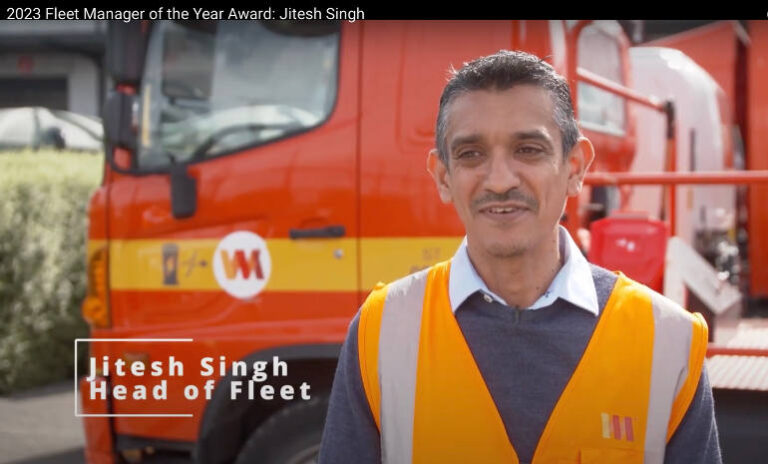At the Gala Awards night held during the 2023 AfMA Fleet Conference and Exhibition, Jitesh Singh, Head of Fleet at Waste Management NZ was announced as the 2023 Fleet Manager of the Year.
Waste Management NZ has solved the conundrum of range versus cost and found a way to reduce emissions in their heavy commercial fleet by converting 20 garbage trucks to electric. Singh sourced the solution and lead the project to convert their fleet to electric vehicles using conversion kits from the Netherlands.
“The benefit of converting trucks to EV does outweigh the cost of conversion. We find many, many advantages of EV trucks in our operation,” says Singh.
“For one they are extremely quiet; they have zero emissions. We save on fuel price. There’s also a savings on service and maintenance. The regenerative function of these trucks means we get more range simply by operating the trucks in a certain manner.”
Singh outlined the challenge facing the fleet industry and acknowledged the strategic pivot required by Fleet Managers in order to start the massive transition to zero emission vehicles within the next decade.
“Over the next five years my role is heavily focused on the decarbonisation of our fleet, ensuring we have the best technology, and state of the art technology to continue to operate our business,” explains Singh.
Waste Management NZ (WMNZ) is New Zealand’s leading waste and environmental services provider, driven by a focus on safety, sustainability and service and underpinned by innovation, with more than 300,000 customers across the country.
They have one of NZ’s largest heavy vehicle fleets of 900 trucks most designed in NZ, and 200 light vehicles. Transitioning to an electric fleet was identified as a key initiative in WMNZ’s Sustainability Commitment, launched in 2016.
The truck fleet requires over 10 million litres of diesel per year and is a key component of WMNZ’s carbon footprint. Each electric truck that is introduced, replacing a diesel-powered vehicle, will save an average of 125 litres of diesel per day. Conversion of the entire fleet would save 100,000 litres of diesel a day. Not only a financial saving, but a massive improvement in our carbon footprint and a corresponding reduction in NZ and global emissions.
For the collection trucks, which on average travel 200km per day, range anxiety was a major concern. The stop-start nature of a collection truck, where the driver stops to pick up and empty a bin up to 1,200 times per day, is a perfect use-case for electric rather than diesel . Each time the truck stops, the deceleration creates regenerative energy that recharges on board batteries. This is in stark contrast to conventional fossil fuel powered vehicles where the energy is lost through braking into the atmosphere as heat.
An electric collection truck pilot started in mid-2016, with EMOSS commissioned to convert three diesel trucks. The first box-body truck arrived back in NZ in late 2016. Today, it is working on a range of collection activities around Auckland and driven approximately 80,000km. An EV Side loader has the ability to collect 1,200 bins a day and operate all day, typical 11 hours day.
Following this initial commitment, WMNZ signed an agreement with EECA to support the development of an electric truck conversion workshop in Auckland which opened in March 2018.
In addition, WMNZ has upskilled its teams to drive, maintain and manage EVs, including co-investment with EECA in the electric vehicle workshops. New skills have been and continue to be recruited to keep them at the forefront of EV technology in NZ and globally.
To date, the EV programme has progressed to include 30 fully electric trucks operating on the road. WMNZ operate one of the largest EV truck fleets in Australasia and also have 93 EV cars in the light fleet.






